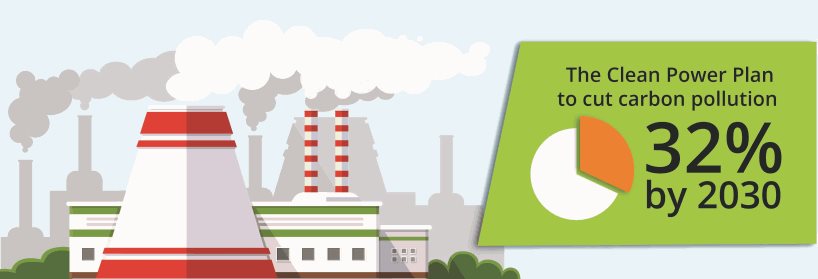Home » Blog » Trading & Risk Management » How Could the Clean Power Plan Affect Utilities?
How Could the Clean Power Plan Affect Utilities?
On August 03, 2015, the Obama Administration unveiled the Clean Power Plan (CPP) with the goal of lowering carbon emissions from existing U.S. power plants by 2030 to 32% below 2005 levels. States were required to meet specific standards with respect to reduction of carbon dioxide emissions.
In October of 2017, the Environmental Protection Agency (EPA) issued a Notice of Proposed Rulemaking (NPRM) proposing to repeal the CPP. This poses the question- will repealing the Clean Power Plan affect utility companies’ plans to cut power plant carbon pollutions?
The repeal of the CPP would likely have minimal impact on utility companies’ plans to meet carbon emission goals. The Department of Energy (DOE) noted 531 coal-generating units were retired between 2002 and 2016. This is due to the corporate and public awareness of the environmental and health effects of carbon emissions, market conditions like the abundant supply of natural gas, the low cost of natural gas, and the steady decline in the price of solar and wind. As a result, coal-fired generation should continue to decline and carbon emissions should continue to fall below 2005 levels by 2030.
As utilities continue to retire or convert existing coal-fired electric generation to gas, this has led to over-utilization of existing natural gas pipeline networks in some parts of the country. This makes it difficult to efficiently balance supply and demand, especially when this coincides with high demand for gas by residential customers. For Pipeline Operators, LDC/Utilities, and Storage Operators looking to respond quickly to changing markets as well as regulatory environments, there is an immediate need to upgrade their legacy in-house systems that may lack the flexibility to respond seamlessly to these ever-evolving conditions.
Whether the challenge is responding to real-time gas markets or ensuring seamless compliance, OATI NAESB WGQ 3.1 certified gas management system has the capability to resolve these challenges and ensure maximum capacity utilization.
For many merchant generators, the increasing adoption of gas-for-power and the associated challenges this change is posing means position management and forecasting load has become a critical part of daily operations. For utilities and Local Distribution Companies (LDC) looking for rapid and highly integrated natural gas trading and scheduling software solutions, OATI is here to help. Its suite of advanced cloud-based solutions have the flexibility, automation, and real-time data integration capabilities that natural gas traders need to make intelligent forecasts and achieve accurate physical and financial positions.
About the author:
Sheldan Perry is a highly skilled professional with more than 25 years of detailed functional and technical knowledge in oil and gas, pipeline transportation, and energy software development. Sheldan is currently the Manager of Gas Systems at OATI and is responsible for coordinating the continuous enhancement of our natural gas transportation management system to meet the ever changing regulatory requirements and maintaining the existing gas management system.
- November 22, 2017
